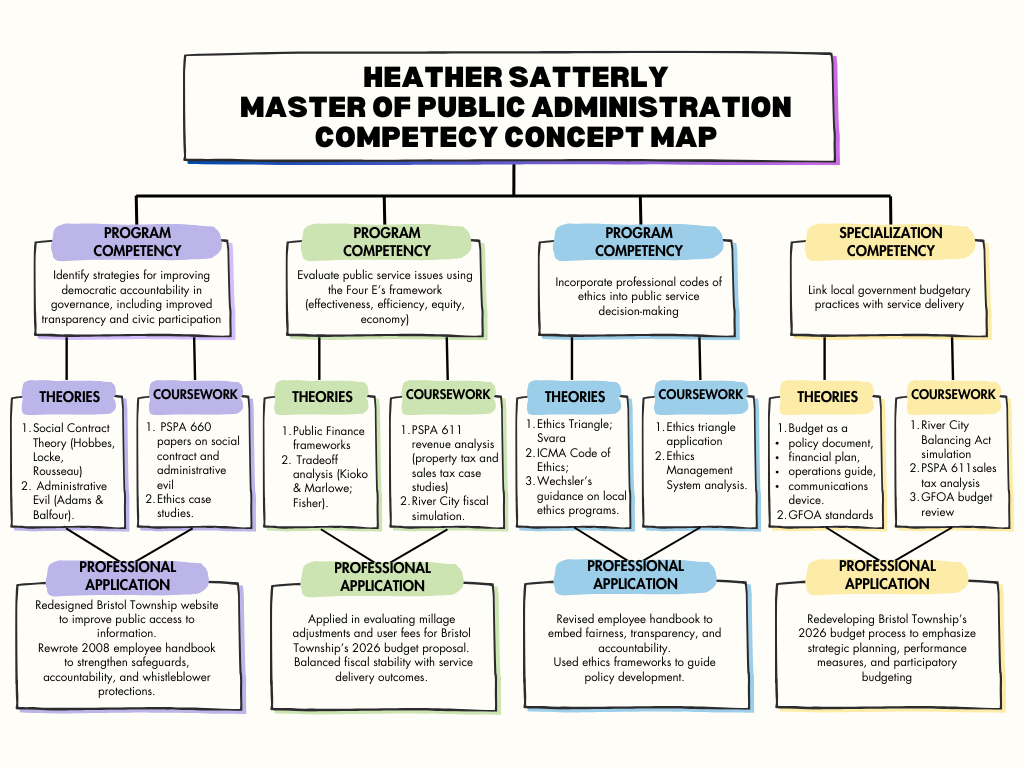
Master of Public Administration - Graduate Student
The mission of the Department of Public Administration is to advance excellence in professional public management through scholarship in teaching, research, and service. The department is committed to strengthening the knowledge and skills that enhance the management and leadership capacity of individuals pursuing public service careers.
Scroll ↓
Public Service Values
-
impartiality, fairness, and justice for all people.
Social equity is the value that led me to public service as a career and has pushed me to strive to make equitable changes in the sector.
I consider myself as a Humanitarian, as defined by Brewer, Seldon and Facer (2000).
“Humanitarians are motivated by a strong sense of social justice and public service…. Like samaritans, this group values many public causes and programs and views government as a vehicle for making society fair… While humanitarians are touched by the plight of the underprivileged, their welfare concerns are more societal than Samaritans… They believe if any group is excluded from society’s prosperity, the entire society if worse off” (Box 2015, 29).
Box, R. (2015). Public Service Values. New York: Routledge.
-
the quality of being honest and having strong moral principles
I believe that integrity is vital to the success of public service. As the trust in public service and government continues to erode across our country, I am emboldened to lead with integrity. As I continue to build relationships with my community, I hope that the community members will trust in my integrity.
-
mental or moral strength to venture, persevere, and withstand danger, fear, or difficulty
It takes courage to stand against the injustices of the world. It takes courage to be the single voice of dissent. It takes courage to try something that can lead to failure. It takes courage to be vulnerable enough to establish trust.
I believe that courage is integral to Social Equity and Integrity.
MPA Core Compentencies
-
The coursework required for PSPA 660 necessitated that I evaluate several ethical theories that have uniquely shaped my approach to identifying strategies for improving democratic accountability in governance, including improved transparency and civic participation.
Social Contract Theory explains how individuals consent to governance for the mutual benefits of an ordered society.[1] This theory provided me with a foundation for understanding the obligations governments owe their residents and underscored the importance of mutual trust in transparency and civic participation. In my professional role, I applied this framework to redesign Bristol Township’s website, ensuring that information on services, budgets, and council meetings is accessible to residents. As a Public Administration Professional, I must keep in mind that the decisions I make have direct impacts on residents, which can subsequently impact whether they feel they are receiving a ‘mutual benefit’ as part of the social contract framework.
The concept of administrative evil also sharpened my perspective. Administrative evil refers to harmful or unethical actions that occur through systemic or organizational bureaucratic processes and procedures.[2] Administrative evil can arise from what appears as benign ethical violations and routine bureaucratic practices that can foster dangerous disparities and systemic injustices.[3] I applied these lessons directly when rewriting Bristol Township’s employee handbook, initially established in 2008. The prior version lacked sufficient safeguards against retaliation, precise accountability mechanisms, and updated ethical guidance. By integrating transparency, whistleblower protections, and a stronger code of conduct, I reduced the risk of organizational processes unintentionally enabling unethical behavior. This project demonstrated how theory translates into practice by fostering a culture of accountability and empathy within the Township.
[1] (Friend, 2006)
[2] (Adams & Balfour, 2013, pp. 14-15)
[3] (Balfour & Alibašić, 2016, p. 5)
-
The Four E’s framework (effectiveness, efficiency, equity, and economy) was reinforced through financial management courses. In PSPA 611, case studies on property taxes and sales taxes highlighted tradeoffs: property taxes provide stability and efficiency but may lack vertical equity.[1] Sales taxes diversify revenue but risk regressivity.[2] These analyses informed my professional approach at Bristol Township when evaluating user fees and millage adjustments while preparing the 2026 proposed budget, ensuring fiscal decisions are weighed against service delivery outcomes.
[1] (Fisher, 2023, pp. 242-243)
[2] (Kioko & Marlowe, 2017, p. 29)
-
PSPA 660 also emphasized the integration of professional codes of ethics into public service decision-making. Svara’s ethics triangle, consisting of a constant push and pull of consequences, duties, and virtues, provided a practical framework for navigating dilemmas.[1] Additionally, Wechsler’s guidance on addressing key areas of ethics concerns, such as conflicts of interest, confidentiality, nepotism, and complicity, reinforced the importance of establishing a strong Code of Ethics program.[2] By pairing the ethics triangle framework and Wechsler’s guidance with the ICMA Code of Ethics, I strengthened my practice by emphasizing accountability, impartiality, and public trust. Professionally, I applied these lessons while revising Bristol Township’s employee handbook. Embedding fairness, transparency, and responsibility into policies ensured staff are guided by ethical principles, not just compliance with laws.
[1] (Svara, 2014, p. 67)
[2] (Wechsler, 2013, pp. 18-20)
-
My specialization in Local Government Management emphasized connecting fiscal tools to service outcomes. In the River City Balancing Act simulation, I learned that public engagement legitimizes difficult budgetary decisions.[1] Similarly, in reviewing Bristol Township’s 2025 budget against Government Finance Officers Association (GFOA) standards, I identified deficiencies in strategic planning, performance measurement, and public engagement. This reinforced the concept that budgets are not just financial plans, but are opportunities for the public to ensure that their local government is meeting their needs.[2] I am actively applying this learning in my current role at Bristol Township by redeveloping our entire budget process for the 2026 budget, with a focus on strategic, long-term planning and resident education and engagement through participatory budgeting opportunities. My efforts linked budgetary practices to actual service delivery improvements that meet the needs of my community.
[1] (Kavanaugh, Lemmie, & Carcasson, 2023)
[2] (Ebdon & Franklin, 2006)
